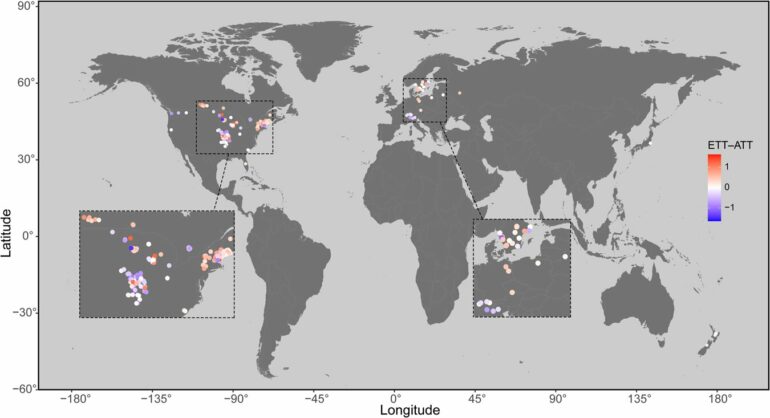As the atmosphere warms up, so do most freshwater lakes. But this isn’t always the case, and little is known about why some freshwater lakes don’t follow this general pattern.
Now, an international research team led by researchers from the Nanjing Institute of Geography and Limnology of the Chinese Academy of Sciences (NIGLAS) has sampled 345 lakes distributed across 12 countries—primarily in the United States and Europe—to investigate controls over the thermal response of temperate lakes to atmospheric warming.
The study was published in Nature Communications on Oct. 16.
In general, surface and deep water temperatures responded differently to atmospheric warming. Specifically, surface water warmed more rapidly than deep water.
However, multi-decadal trends in the relationship between air temperature and water temperature often diverged or even showed an opposite trend for individual lakes.
The researchers found that local climate, land cover, geomorphology, and water transparency helped explain the differences in temperature change between water and air.
Clear, cold, and deep lakes, especially those at high elevations and in areas of natural land use, exhibited the highest responsiveness to atmospheric warming.
In contrast, lakes with more nutrient pollution—such as those covered with green algae—are less sensitive to global warming than clear, less polluted lakes. “Since the nutrients in green surface waters can act as a shade, [they keep] the deep waters cool,” said Dr. Zhou Jian, first author of the study.
The researchers also found that lakes become less responsive to air temperature change as the atmosphere warms. “As lakes warm up, they start to lose water by evaporation and this acts to cool them off. Just like we sweat to cool off, lakes ‘sweat’ by evaporating water to get rid of excess heat,” said Prof. Shi Kun from NIGLAS, co-corresponding author of the study.
The study suggests it is important to account for different lake responses to climate warming when developing adaptation and mitigation strategies.
“Lake management practices need to consider where lakes are, what they are surrounded by, and how sensitive they are to unique and interactive effects of climate change and human activities,” said Prof. Qin Boqiang, co-corresponding author of the study.
More information:
Jian Zhou et al, Controls of thermal response of temperate lakes to atmospheric warming, Nature Communications (2023). DOI: 10.1038/s41467-023-42262-x
Provided by
Chinese Academy of Sciences
Citation:
Study reveals factors affecting response of temperate lakes to atmospheric warming (2023, October 31)
